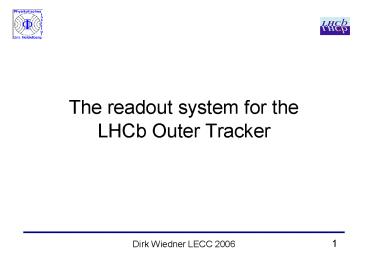The readout system for the LHCb Outer Tracker - PowerPoint PPT Presentation
1 / 20
Title:
The readout system for the LHCb Outer Tracker
Description:
The readout system for the LHCb Outer Tracker. LHCb. RICH: PID. K, separation. Calorimeter: PID: e, ... 40 MHz collision rate. Reference Frequency. In average ... – PowerPoint PPT presentation
Number of Views:72
Avg rating:3.0/5.0
Title: The readout system for the LHCb Outer Tracker
1
The readout system for the LHCb Outer Tracker
2
LHCb
Particle ID
Tracking
- VELO
- primary secondary
- vertex
- impact parameter
3
Outer Tracker
4
Requirements
- 40 MHz collision rate
- Reference Frequency
- In average one interaction every 25 ns
- 1.1 MHz readout
- B hadron production rate around 75 kHz
- Radiation tolerance 10 kRad
- Resolution
- ?p/p 0.4 (20 GeV particle)
- 200 µm in x
- 1 ns drift time resolution
x
5
Outer Tracker FE Electronics
DAQ PCs
TDC L0 Buffer
Zero suppression
GOL
ASD
100m
200 fC
Radiation 10 kRad/ 10y
counting room
LV
HV
TFC
ECS
Cooling
Power / Control
Electronics Service Box
FE Electronics on the detector
6
Amplifier
- ASDBLR (ATLAS DEMILL)
- Amplifier with around 12 ns shaping time
- 2x 8 Channels per board
7
ASDBLR Testing
Eff
- Chips categorized
- pre-selection
- current consumption
- broken channels etc.
- ?62.2 accepted
- performance
- threshold spread checked
- ?32 best chips chosen
0.5
Half Efficiency Vthr50
8
TDC (OTIS)
TDC Time to Digital Converter
Readout window
clock (40 MHz)
Amplifier signal
coding 2 bit Bx 6 bit fine time
- 32 channel TDC
- one time bin is 25 ns / 64 390 ps
- time reference is rising edge of LHC clock
- Read out window 75 ns
- Outer Tracker Time Information System
9
TDC linearity
Drift time binary
Delay ns
10
Gigabit Optical Link board
- 1.6 Gbit/s output
- 1 fibre per 128 channels
- Fast and slow control distribution
- Jitter filter (7ps RMS)
- Low voltage regulators
11
GOL Board jitter
- Jitter in optical data output sufficiently low
- Production bit error rate test with 9dB
attenuation (4 min.)
12
Frontend box
Water cooled Power dissipation 20 W
Gigabit Optical Link board
432 Frontend Boxes
TDC boards
HV-boards Inside
Amplifiers
13
Optical Receiver Card
- Input mezzanine for DAQ board (TELL1)
- 12 optical inputs
- 19,2 Gbit/s
- 288 parallel electrical outputs
- Bit error rate below lt 10-15
14
DAQ Board TELL1
- Optical receiver card
- Processing FPGAs
- SyncLink FPGA
- Quad Gigabit ethernet transmitter mezzanine
- Credit Card PC
- 1 MHz readout to PC farm LHCb wide
EPFL (Lausanne)
15
TELL1
- Data from 9x128 channles (quarter layer)
- Deserialisation
- Synchronisation
- Zero suppression
- 4x Gbit Ethernet transmission to PC farm
16
Integration
- OT specific
- FE-Boxes
- Distribution box
- LHCb wide
- DAQ TELL1
- Readout Supervisor ODIN
- Slow Control SPECS, PVSS
17
Performance
- Drift time resolution 0.5 ns
- Efficiency gt94
- (uncorrected)
- Resolution 175 µm
- Readout electronics works form straw to PC
Drift time histogram
ns
18
Summary and outlook
- Achieved
- Pre series production showed good performance in
beam test with 512 channels - Readout electronics in production (500 units)
- Produced tested
- all Optical Receiver Cards
- all ASICs, see Poster session
- gt100 boards of each type in the FE-box
- Next step
- Assembly and test of FE-boxes
- Installation commissioning at CERN
19
LHCb Outer Tracker group
- China, Beijing Tsinghua University Center for
High Energy Physics - Jianping CHENG, Yuanning GAO, Alex GONG,
Guanghua GONG, Beibei SHAO, Leping ZHANG,
Shouzhao ZHANG, Kaikuo ZHUO - Germany, Dortmund Universität Dortmund
Fachbereich Physik - Matthias DOMKE, Christoph ILGNER, Markus
KOLANDER, Magnus LIENG, Mirco NEDOS, Bernhard
SPAAN, Klaus WACKER, Kai WARDA - Germany, Heidelberg Universität Heidelberg
Physikalisches Institut - Johannes ALBRECHT, Sebastian BACHMANN, Yuri
BAGATURIA, Johan BLOUW, Marc DEISSENROTH, Rolf
DUBITZKY, Franz EISELE, Tanja HAAS, Siegfried
HENNEBERGER, Peter IGO-KEMENES, Jan KNOPF,
Stephanie MENZEMER, Simon RABENECKER, Albert
RAUSCH, Christian RUMMEL, Rudolf RUSNYAK, Adrian
RERIEANU, Manuel Schiller, Rainer SCHWEMMER, Uwe
STANGE, Ulrich TRUNK, Ulrich UWER - Netherlands, Amsterdam NIKHEF
- Jan AMORAAL, Ruud ARINK, Thomas BAUER, Eduard
BERBEE, Adrianus BERKIEN, Herman BOER ROOKUIZEN,
Edwin BOS, Jarl BUSKOP, Loek CEELIE, Hans DE
VRIES, Martin DOETS, Tristan DU PREE, Rogier
Elsinga, Johan KOS, Hendrik GROENSTEGE, David
GROEP, Yuri GUZ (on leave from HEP Institute
Protvino), Eric HEINE, Bart HOMMELS, Eddy JANS,
Rob KLOEPPING, Marco KRAAN, Franciscus KROES,
Adrie LIEM, Marcel MERK, Sander MOS, Franciscus
MUL, Berend MUNNEKE, Antonio PELLEGRINO, Eduardo
RODRIGUES FIGUEIREDO, Hendrik SCHUIJLENBURG, Tom
SLUIJK, Jan SPELT, Martinus VAN BEUZEKOM, Ed VAN
DE BORN, Peter VANKOV, Martijn VAN OVERBEEK,
Oscar VAN PETTEN, Jeroen VAN TILBURG, Wilco VINK,
Leo WIGGERS, Gabriel YBELES SMIT, Marko ZUPAN,
Albertus ZWART
- Netherlands, Amsterdam Universiteit van
AmsterdamGerhardus VAN APELDOORN - Netherlands, Amsterdam Vrije Universiteit
- Hendrik BULTEN, Michael DE JONG, Tjeerd KETEL,
Basma MCHAREK, Jacopo NARDULLI, Gerhard RAVEN,
Eduard SIMIONI, Niels TUNING, Johannes VAN DEN
BRAND - Poland, Cracow The Henryk Niewodniczànski
Institute of Nuclear Physics \ - Krzysztof CIBA, Leszek HAJDUK, Agnieszka KOWAL,
Jerzy MICHALOWSKI, Bogdan MURYN, Zbigniew
NATKANIEC, Agnieszka OBLAKOWSKA-MUCHA, Grzegorz
POLOK, Mariusz WITEK - Poland, Warszawa Soltan Institute for Nuclear
Studies - Marek ADAMUS, Arkadiusz CHLOPIK, Zbigniew GUZIK,
Adam NAWROT, Andrzej SREDNICKI, Krzysztof
SYRYCZYNSKI, Marek SZCZEKOWSKI - Former Members (incomplete)
- Harald DEPPE, Martin FEUERSTACK RAIBLE , Jens
KESSLER, Ralf MUCKERHEIDE, Raimund RUSCHMANN,
Andre SROWIG, Michael WALTER, Dirk WIEDNER
20
Time resolution
- Time difference from two scintillators
- RMS 0.72 ns































